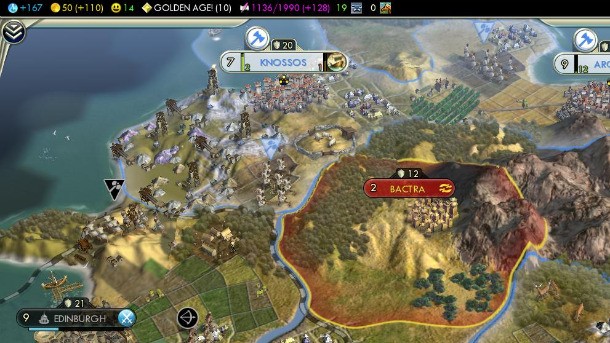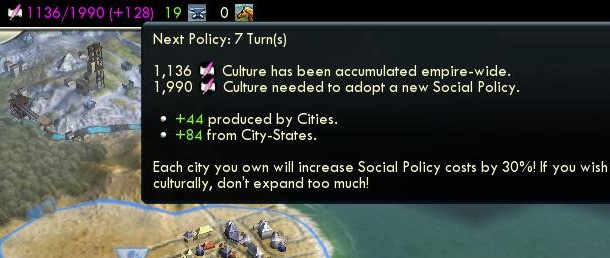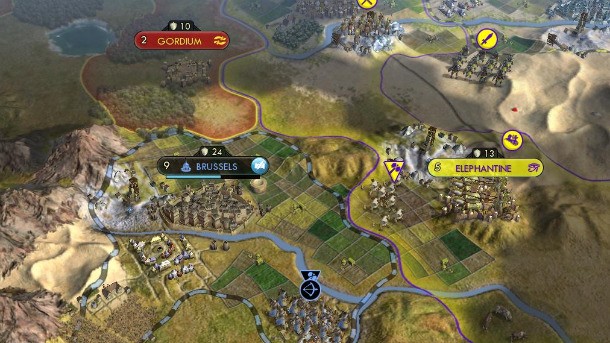Befriending Civilization V's City-States

My previous hands-on report with Civilization V indicated that I felt pursuing diplomatic relationships with the new city-states to be underpowered relative to other ways to spend your resources. A few thousand years in Alexander the Great's shoes has taught me otherwise.
First things first, for those of you not up to speed on Civ V: City-states are minor nations that never expand, but will defend themselves and can be befriended by major civilizations. When you're allied with a city-state (which takes a 500 gold buy-in and 250 gold every 30 turns to maintain the relationship, though those numbers can be modified by various things as you'll see in a minute), they'll send you any luxury or strategic resources they have and help you out depending on what sort of state they are. Maritime states send food to each of your cities every turn, cultural states add culture to your civilization, and military states occasionally gift you units.
The baseline benefit doesn't sound that good on paper. After all, 250 gold can be a lot of things: An instant worker unit, a research agreement with a rival, a few hexes brought into your city borders, or more. Thirty turns of a luxury resource (all city-states spawn near one, and sometimes will expand their borders to control a second or possibly a strategic resource like iron or horses) and a little food or culture or a single unit isn't that great, especially considering that it's not a permanent bonus and it can all be for naught if a rival conquers the city-state. On the other hand, you can make it work for you with a little effort. Allow me to explain.
Alexander's trait is the Hellenic League, which makes his influence with city-states degrade at half the normal rate. Right out of the gates, Greece gets 60 turns of alliance per 250 gold rather than the typical 30, significantly altering the equation. Furthermore, the Patronage social policy*, which is available starting in the medieval epoch, grants several more city-state bonuses, and is worth a deeper look.
*Civ V's social policies are a replacement for Civ IV's civics. These permanent choices are unlocked by accumulating culture through constructing buildings like Temples in your cities, and by allying with cultural city-states. You get to pick a new social policy every X amount of culture generated, where X depends on the number of cities you have and how many policy picks you've already gotten. Each policy branch – Tradition, Honor, Patronage, Rationalism, etc. – has several sub-branches, each of which cost a pick on their own. Maxing out the Patronage branch, for instance, costs a total of six picks – which is something like 100 turns of cultural development, even if you're focusing on it.
(Next up: The power of Patronage) 
So, what does this enormous investment in Patronage give us? Check it:
- Influence degradation drops by another 25% (putting Alex's at -0.37 influence/turn due to Hellenic League)
- Allied city-states contribute half the research they generate for themselves to your empire
- Gifted luxury resources generate 50% more happiness, and gifted strategic resources are doubled in quantity
- Allied city-states occasionally gift you Great People
- Your minimum influence level is 20, making it easier to make new friends
- Monetary gifts generate 25% more influence
Holy crap, that's a lot of stuff. Now, granted, the opportunity cost is the development of a different policy branch. If you focus on Honor, for instance, you can get half-price unit upgrades, significant combat strength bonuses, and more. Still, Patronage is proving incredibly powerful in my current game. With just five cities in my empire itself (last I looked I'm the third-largest faction, behind the Aztecs and Songhai) I'm crushing my rivals in technological research, culture generation, Wonder production, and revenue. I'm able to do this for a couple of reasons:
Resource trading is what's up. Befriending all these city-states has me swimming in luxury resources, and of course I've got several in my empire itself. Though you can't turn around and trade the resources you receive from allied city-states, my people are so thrilled with what we're getting in gifts that I can trade all the luxuries I produce myself. Since happiness is tough to come by in Civ V, my rivals are more than happy to buy my excess resources from me – giving me the cash I need to ally with more city-states or to reinvest in my infrastructure and military.
No organizational headaches. The bonuses you get from allied city-states, even with Patronage maxed out, are nowhere near what you would get from the same city if it were under your direct control. However, there's no overhead – Civ V punishes over-expansion with penalties to happiness, maintenance costs, and the natural difficulty of defending more territory. You don't have to worry about any of that with city-states, letting you keep your empire lean and mean while still producing at a high level.

One thing I was pleased to see is that you take a diplomatic hit with your rivals for aggressively expanding your influence over city-states just as you do for taking a huge tech lead, settling land near them, building a large military, or any other threatening action. I lost a very profitable trading partner in Ramesses when he cut diplomatic ties with me for allying with Brussels, which he considered within his sphere of influence. I've had to do a lot more diplomatic tap-dancing with my rivals in this game than any other round of Civilization I've played over the last two decades. Dealing with the other great leaders has been a satisfying sub-game of its own; normally I play an extremely aggressive military state, so I'm less concerned about what they think of me and more worried about how many swords they can put on the field.
The best part about all this is that a city-state centered strategy is an endgame in and of itself. The diplomatic victory condition in Civ V is centered around city-states; they get votes in the U.N. just like major powers. I already have enough votes to be installed as Secretary-General, and the concept of steam power has yet to debut anywhere in the world. If I can keep this up, I've got an easy win in the bag as soon as I build the U.N. Whether or not my rivals let me – AI factions have gotten steadily more aggressive toward city-states as time goes by in my previous games – is another question.
Civ V's September 21st launch can't come soon enough.

Get the Game Informer Print Edition!
Explore your favorite games in premium print format, delivered to your door.
- 10 issues per year
- Only $4.80 per issue
- Full digital magazine archive access
- Since 1991









